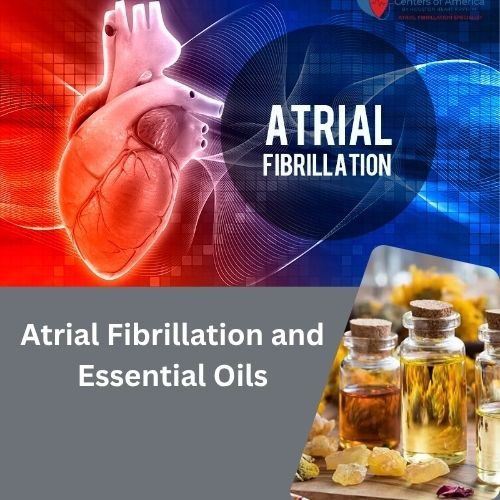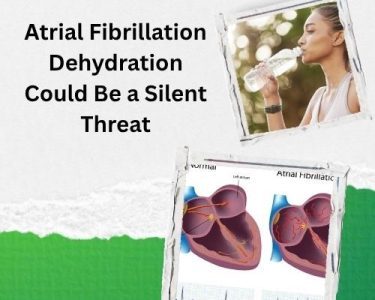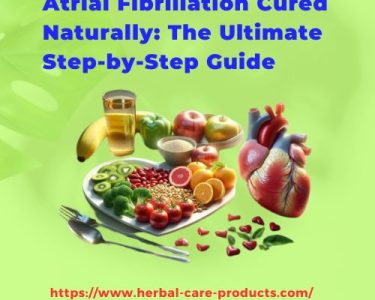Atrial Fibrillation (AFib) is one of the most common types of irregular heart rhythms affecting millions of people worldwide. Characterized by rapid and erratic electrical signals in the heart’s upper chambers (atria), AFib can cause palpitations, fatigue, shortness of breath, and an increased risk of stroke.
While conventional treatments such as medications, lifestyle adjustments, and in some cases, surgery remain the cornerstone of management, many individuals are exploring complementary therapies to support heart health. Among these, essential oils have gained attention for their potential to reduce stress, improve circulation, and promote Natural Heart Care.
The connection between Atrial Fibrillation and Essential Oils, their benefits, precautions, and the best ways to use them for a healthier heart.
Understanding Atrial Fibrillation
Atrial Fibrillation occurs when the heart’s electrical system malfunctions, leading to irregular contractions of the atria. Instead of beating in a coordinated rhythm, the upper chambers quiver or fibrillate.
Common Causes of AFib Include:
- High blood pressure
- Heart valve disorders
- Coronary artery disease
- Thyroid imbalances
- Excessive alcohol or caffeine consumption
- Sleep apnea
- Chronic stress or anxiety
The condition can be paroxysmal (occasional episodes), persistent (lasting longer than 7 days), or permanent. Regardless of type, the goal is to control the heart rate, prevent clots, and manage triggers that worsen symptoms.
Related Article: Atrial Fibrillation and Flying: 7 Essential Tips for a Stress-Free Flight
Why Consider Essential Oils for AFib?
Essential oils are concentrated plant extracts known for their therapeutic properties. While they are not a Cure for Atrial Fibrillation, they can complement medical treatment by addressing underlying contributors such as stress, anxiety, poor circulation, and inflammation—all of which can impact heart rhythm.
When used correctly, Atrial Fibrillation and Essential Oils can go hand in hand to promote Natural Heart Care, enhancing relaxation and supporting cardiovascular wellness.
How Essential Oils Support Heart Health
Essential oils contain active compounds that can influence physiological and emotional well-being. Here are several ways they can contribute to Natural Heart Care:
- Stress Reduction
Chronic stress triggers the release of cortisol and adrenaline, which can elevate heart rate and blood pressure. Calming essential oils such as lavender, chamomile, and bergamot help reduce anxiety and promote relaxation. - Improved Circulation
Certain oils like rosemary and cypress enhance blood flow, reducing pressure on the heart. - Anti-inflammatory Effects
Inflammation is a key player in cardiovascular diseases. Oils such as frankincense and turmeric possess anti-inflammatory properties that may benefit heart tissues. - Better Sleep Quality
Poor sleep increases AFib risk. Essential oils like lavender and sandalwood support restful sleep, allowing the heart to recover. - Blood Pressure Regulation
Oils like ylang-ylang and marjoram can help balance blood pressure, an important factor for people with AFib.
Top Essential Oils for Atrial Fibrillation
Here’s a closer look at the best essential oils that can support heart rhythm and overall cardiovascular health.
Related Article: Atrial Fibrillation Dehydration Could Be a Silent Threat: Doctors Warn
1. Lavender Oil
Lavender is well-known for its calming and stress-relieving effects. Studies show it can lower blood pressure, reduce heart rate, and improve overall mood.
Benefits:
- Reduces anxiety and palpitations
- Promotes relaxation and sleep
- Helps regulate blood pressure
How to Use:
Diffuse a few drops in your bedroom before sleep, or mix with a carrier oil and apply to your wrists or chest.
2. Ylang-Ylang Oil
Ylang-Ylang is often called the “heart oil” due to its ability to balance emotions and promote heart relaxation.
Related Article: Atrial Fibrillation Cured Naturally: The Ultimate Step-by-Step Guide
Benefits:
- Regulates heartbeat
- Reduces stress and anxiety
- Lowers high blood pressure
How to Use:
Add 2–3 drops to a diffuser or blend with a carrier oil for a soothing chest massage.
3. Bergamot Oil
Bergamot’s citrusy aroma is uplifting and calming, making it excellent for emotional balance and cardiovascular support.
Benefits:
- Reduces stress-related heart strain
- Enhances circulation
- Supports mood balance
How to Use:
Diffuse in your workspace or add to a warm bath for a heart-calming experience.
4. Frankincense Oil
Frankincense has been revered for centuries for its healing and anti-inflammatory properties.
Benefits:
- Reduces oxidative stress in heart tissue
- Supports relaxation and breathing
- Improves cellular health
How to Use:
Inhale directly from the bottle or apply topically with a carrier oil to the chest area.
5. Cypress Oil
Cypress promotes circulation and helps support vascular health.
Benefits:
- Strengthens veins and arteries
- Reduces heart palpitations
- Encourages blood flow
How to Use:
Mix a few drops with coconut oil and massage onto the chest or pulse points.
6. Marjoram Oil
Marjoram is known as a natural sedative and heart tonic.
Benefits:
- Relaxes heart muscles
- Regulates heartbeat
- Alleviates nervous tension
How to Use:
Diffuse during meditation or blend with lavender for a calming effect.
7. Roman Chamomile Oil
Chamomile is gentle yet powerful for soothing nerves and supporting cardiac rhythm.
Benefits:
- Calms emotional distress
- Promotes restful sleep
- Reduces blood pressure
How to Use:
Add a few drops to your diffuser at bedtime or mix with carrier oil for topical use.
Combining Essential Oils for a Heart-Healthy Blend
For Natural Heart Care, blending essential oils can create synergistic effects. Here’s a simple Heart-Calming Blend you can try:
Ingredients:
- 4 drops Lavender
- 3 drops Ylang-Ylang
- 2 drops Bergamot
- 2 drops Frankincense
- 1 tablespoon carrier oil (such as jojoba or coconut oil)
Directions:
Mix all ingredients and apply gently to the chest area, wrists, or behind the ears. Use before bedtime or during stressful situations.
Best Methods to Use Essential Oils for Atrial Fibrillation
There are several ways to safely and effectively use essential oils for Atrial Fibrillation and Essential Oils therapy:
- Aromatherapy Diffusion
Add 3–5 drops of your chosen oil to a diffuser and inhale the calming aroma for 30–60 minutes. - Topical Application
Always dilute essential oils with a carrier oil before applying them to the skin. Massage gently over the chest, neck, or wrists. - Inhalation
Add a drop or two of essential oil to a tissue and inhale deeply to quickly calm your nerves. - Bath Soak
Combine essential oils with Epsom salts and add to warm bathwater. This promotes relaxation and better circulation. - Compress
Add a few drops of essential oil to warm water, soak a cloth, and place it over the heart or neck area to soothe tension.
Lifestyle and Diet Tips for Natural Heart Care
While essential oils can support your heart health, they work best when combined with a heart-friendly lifestyle. Here are some tips to enhance your Natural Heart Care routine:
Related Article: What is the Latest Treatment for Atrial Fibrillation?
1. Manage Stress
Engage in yoga, meditation, or deep breathing exercises to reduce stress-induced heart rhythm issues.
2. Eat Heart-Healthy Foods
Include omega-3-rich foods (like salmon and flaxseeds), leafy greens, whole grains, and nuts in your diet.
3. Stay Active
Regular low-impact exercises such as walking, swimming, or cycling strengthen the heart and improve circulation.
4. Limit Stimulants
Reduce caffeine and alcohol intake as they can trigger AFib episodes.
5. Stay Hydrated
Dehydration can cause electrolyte imbalances that affect heart rhythm.
6. Sleep Well
Aim for 7–8 hours of sleep per night to support overall cardiovascular balance.
Precautions When Using Essential Oils for Atrial Fibrillation
Although essential oils are natural, they must be used with caution, especially when dealing with a condition like AFib.
- Consult your doctor before starting any aromatherapy regimen.
- Avoid internal use unless guided by a qualified practitioner.
- Dilute oils properly before applying to the skin to prevent irritation.
- Avoid stimulant oils like rosemary or eucalyptus if you are sensitive to rapid heartbeats.
- Monitor your response — discontinue use if you experience dizziness, rapid heartbeat, or irritation.
Remember, essential oils complement medical treatment but do not replace prescribed medications or therapies for AFib.
Scientific Research on Essential Oils and Heart Health
Several studies highlight the benefits of essential oils on cardiovascular function:
- A study in the Journal of Alternative and Complementary Medicine found that lavender oil aromatherapy helped lower heart rate and blood pressure in patients with stress-related symptoms.
- Research in Evidence-Based Complementary and Alternative Medicine reported that bergamot essential oil reduced anxiety and improved autonomic nervous system balance.
- Another study published in Phytotherapy Research indicated that ylang-ylang oil can significantly reduce blood pressure and promote calmness, which benefits those at risk of arrhythmia.
While research on Atrial Fibrillation and Essential Oils is still emerging, these findings support their role in holistic heart wellness.
Creating a Daily Routine for Natural Heart Care
Here’s a simple daily plan to integrate essential oils into your Natural Heart Care routine:
Morning Routine
- Diffuse bergamot or ylang-ylang while you get ready for the day.
- Take a 10-minute mindfulness session using frankincense inhalation.
Afternoon Routine
- If you feel stressed, inhale lavender oil directly from the bottle or apply diluted oil to your temples.
Evening Routine
- Add a few drops of chamomile and lavender to a warm bath.
- Diffuse calming oils before bedtime to encourage deep, restorative sleep.
Conclusion
Managing Atrial Fibrillation and Essential Oils together can offer a holistic path toward better heart health and emotional balance. While essential oils are not a replacement for medical treatment, they play a valuable role in Natural Heart Care by reducing stress, improving circulation, and supporting overall well-being.
Whether you’re diffusing lavender to calm your nerves, massaging marjoram oil for relaxation, or creating a heart-friendly blend to enhance peace, essential oils can be a gentle yet powerful ally in your journey toward heart wellness.
Always remember to consult your healthcare provider before incorporating essential oils into your heart health plan—especially if you’re taking medications or have an existing heart condition.
By combining medical guidance, lifestyle changes, and the natural benefits of essential oils, you can take meaningful steps toward achieving a calmer rhythm—both in your heart and in your life.




